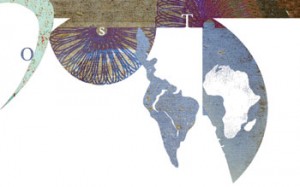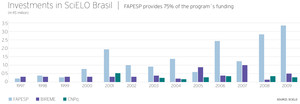 MARCOS GARUTIThe international influence of SciELO, (Scientific Electronic Library Online), a program created a little over ten years ago by FAPESP in partnership with the Centro Latino-Americano e do Caribe de Informação em Ciências da Saúde/Bireme Latin American and Caribbean Center for Information on Health Sciences, is increasing the dissemination of scientific production by Brazil and other countries that have joined this initiative. Last November, South Africa, which has nine Nobel Prize recipients, four of whom come from the field of sciences, decided to adopt SciELO as the platform for the publication of its high-quality scientific publications. The first South African periodicals are already part of the electronic library as part of a pilot project. In addition to gaining space among the developing nations outside South America, thus expanding its activities to another continent, SciELO has begun to attract the attention of leading exponents of global sciences. A recent example in this respect comes from Science scientific magazine, one of the most highly respected publications in the field of advanced lines of research.
MARCOS GARUTIThe international influence of SciELO, (Scientific Electronic Library Online), a program created a little over ten years ago by FAPESP in partnership with the Centro Latino-Americano e do Caribe de Informação em Ciências da Saúde/Bireme Latin American and Caribbean Center for Information on Health Sciences, is increasing the dissemination of scientific production by Brazil and other countries that have joined this initiative. Last November, South Africa, which has nine Nobel Prize recipients, four of whom come from the field of sciences, decided to adopt SciELO as the platform for the publication of its high-quality scientific publications. The first South African periodicals are already part of the electronic library as part of a pilot project. In addition to gaining space among the developing nations outside South America, thus expanding its activities to another continent, SciELO has begun to attract the attention of leading exponents of global sciences. A recent example in this respect comes from Science scientific magazine, one of the most highly respected publications in the field of advanced lines of research.
In the editorial named “Globalizing the publication of science,” the August 21st issue of Science praises the work done by SciELO and names it as a model for the dissemination of scientific production from developing countries. According to the text, written by Wieland Gever, professor emeritus of medical biochemistry at South Africa’s Capetown University and former president of the South Africa Academy of Sciences, “this system (SciELO) has unveiled the existence of locally-produced scientific journals and articles, which are frequently referred to in journals indexed by the ISI (Institute for Scientific Information) data base,” in addition to having a major impact on the SciELO’s journal data base. The article in Science states that more non-developed countries, especially those from Africa, should choose to publish their scientific journals in SciELO or in a similar system, a decision which would probably increase the global penetration of their scientific periodicals. “The editorial is outstanding recognition of the good work done by SciELO,” says Abel Packer, operating coordinator of SciELO.
Historically, FAPESP has contributed approximately 75% of the investments in the SciELO Brasil program, which began as a pilot project in 1997 and was permanently implemented the following year. From 1997 until the end of this year, the Foundation will have invested approximately R$ 17 million in the e-library. Of the total budget amount of R$ 4 million allocated for SciELO in 2009, FAPESP will provide R$ 3.3 million, Bireme will provide R$ 450 thousand and the Conselho Nacional de Desenvolvimento Científico e Tecnológico/CNPq agency, which began to support the initiative in 2002, will provide R$ 250 thousand.
SciELO was created within FAPESP, with the enthusiastic support of the Foundation’s directors, “says Rogério Meneghini, the e-library’s scientific coordinator and one of its creators. – It was one of the first projects to apply the open access model to scientific articles.” In the opinion of Carlos Henrique de Brito Cruz, the Foundation’s scientific director, the results of SciELO “have been exemplary and have been acknowledged by independent observers from a number of entities abroad.” Brito Cruz also states that “the articles published in the journals in SciELO have been frequently quoted internationally, which has generated benefits for scientific development in São Paulo and Brazil.”
 When it went into operation, SciELO included 10 scientific journals, all of them from Brazil. At present, the e-library has 637 periodicals from 8 Iberian American countries; 197 are from Brazil. Brazil is followed by Chile (81 journals) and by Argentina (54 journals). Journals from other parts of the world, such as Jamaica and South Africa, have joined the system. “Today, the e-library has 5 periodicals from South Africa, and we expect to have another 100 journals in the next three years. We also expect to have a periodical from Italy soon and another one from the Middle East; both will be in the public health category,” says Packer. This geographic expansion strategy of the journals in the e-library – has increased the value of the entire collection even more, benefiting all the publications involved in this project,” says Brito.
When it went into operation, SciELO included 10 scientific journals, all of them from Brazil. At present, the e-library has 637 periodicals from 8 Iberian American countries; 197 are from Brazil. Brazil is followed by Chile (81 journals) and by Argentina (54 journals). Journals from other parts of the world, such as Jamaica and South Africa, have joined the system. “Today, the e-library has 5 periodicals from South Africa, and we expect to have another 100 journals in the next three years. We also expect to have a periodical from Italy soon and another one from the Middle East; both will be in the public health category,” says Packer. This geographic expansion strategy of the journals in the e-library – has increased the value of the entire collection even more, benefiting all the publications involved in this project,” says Brito.
SciELO only indexes and publishes scientific journals with regular periodicity, work according to the peer review model (before acceptance, the articles are submitted to a review process by peers) and agree to maintain the contents entirely open and access-free. The collection comprises journals from all the fields of science, although some national collections, such as the ones from Cuba and Spain, began with periodicals from the medical sciences field. Many journals in the system are still from the medical field; however, the e-library also has publications in the fields of the humanities.
According to Packer, the global penetration of Brazilian scientific journals in the SciELO collection is evident. Each month, the pages of the e-library get an average of 9 million hits; 100 countries have registered at least 2,500 visits. “The impact factor of Brazilian journals indexed in the Web of Science data base (owned by the Thomson Reuters company) and in SciELO has increased by over 200% on average in the period from 1997-2008,” says the e-library’s operations coordinator. “For the first time ever, we have national publications with an impact factor that is higher than 1.” This means that last year the scientific articles published in the period from 2006 to 2007 in the referred periodicals were referred to at least once, on average, by other journals that are part of the same data base. Four publications have achieved this level: “Memórias do Instituto Oswaldo Cruz” (Fiocruz), Brazilian Journal of Medical and Biological Research ( the Associação Brasileira de Divulgação Científica association), Journal of the Brazilian Chemical Society ( the Sociedade Brasileira de Química society) and the “Revista Brasileira de Psiquiatria” ( the Associação Brasileira de Psiquiatria, Psychiatry Association).
Republish